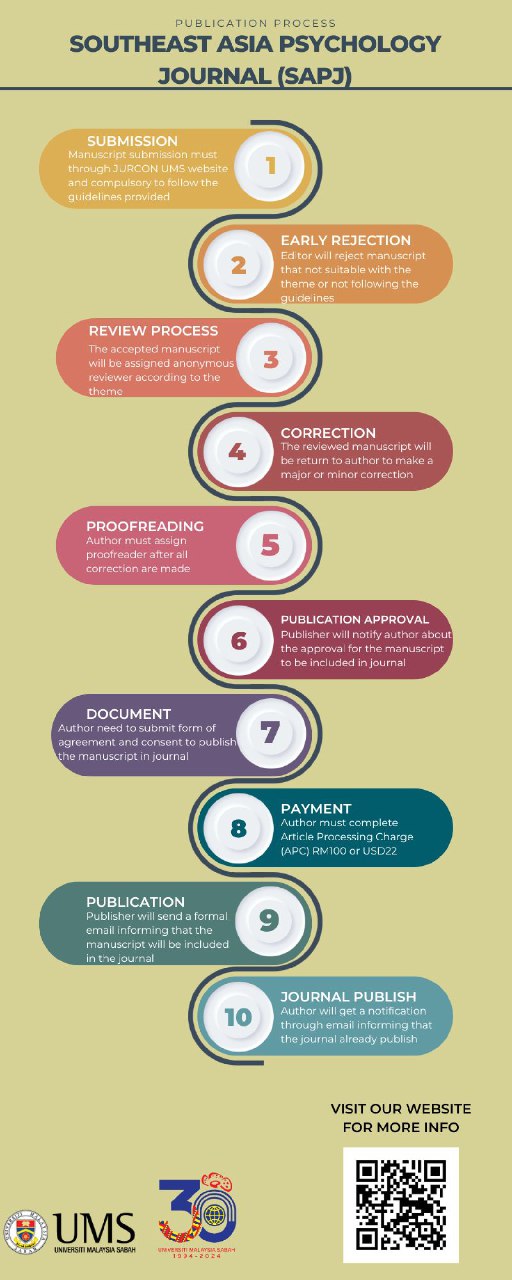DESCRIPTIVE STUDY OF TEACHER SELF EFFICACY WITH GENDER PERSPECTIVE IN KINDERGARTEN TEACHERS
DOI:
https://doi.org/10.51200/sapj.v11i1.4886Keywords:
Teacher Self Efficacy, Gender, Kindergarten Teacher.Abstract
Teachers are not always sure with their own abilities when teaching, hesitant to take action when they meet students who are considered difficult to direct and need support to communicate student progress to parents. The competence of teachers is based on belief in their own abilities, named self-efficacy. Teacher self-efficacy is the belief that a teacher has ability to teach, manage classes, make decisions, motivate and communicate with students effectively. Objective: describe teacher self-efficacy and to prove differences in teacher self-efficacy levels based on gender of kindergarten teachers in Tangerang, Indonesia. Methods: quantitative research using survey research methods with the non-probability sampling technique of the convenience method. The research subjects (N = 54) were kindergarten teachers. The descriptive statistical test in this study used a comparison between the hypothetical mean scale and the empirical mean. The Crosstabs method to see the relationship between teacher self-efficacy based on gender and the Explore method to determine teachers who have the highest and lowest levels of teacher self-efficacy based on gender. Results: with a measurement scale of 1-7, the hypothetical mean is 4 < 5.3188 the empirical mean of teachers' self-efficacy, shows that kindergarten teachers have a high level of teacher self-efficacy. In addition, Chi-Square = 48,938 with a significance value (p) 0.049 <0.05, shows that there is a significant relationship to the teacher self-efficacy based on the gender of kindergarten teachers in Tangerang. Conclusion: kindergarten teachers at several kindergarten school in Tangerang have a high level of teacher self-efficacy and there is a significant relationship between teacher self-efficacy and gender.
References
Cohen, S., Kessler, R. C., & Gordon, U. L. (1995). Measuring Stress: A Guide for Health and Social Scientists. Chapter One. New York: Oxford.
Cansoy, R., Polatcan, M., & Parlar, H. (2018). Research on teacher self-efficacy in turkey: 2000-2017. World Journal of Education, 8(4), 133-145. https://doi.org/10.5430/wje.v8n4p133
Concannon, J. P., & Barrow, L. H. (2009). A CrossSectional Study of Engineering Students’ SelfEfficacy by Gender, Ethnicity, Year, and Transfer Status. Journal of Science Education and Technology, 18(2), 163–172. https:// doi.org/10.1007/s10956-008-9141-3
Feist, J. & Feist, G. (2018). Theories of personality. New York: Mc Graw Hill.
Henson, R. K. (2002). From adolescent angst to adulthood: Substantive implications and measurement dilemmas in the development of teacher efficacy research. Educational psychologist, 37(3), 137-150.
Kasturi, K., Sulton, S., & Wedi, A. (2021). How Self Efficacy in Mathematic Based on Gender Perspective?. Edcomtech: Jurnal Kajian Teknologi Pendidikan, 6(1), 36-45.
Klassen, R. M., & Chiu, M. M. (2010). Effects on teachers' self-efficacy and job satisfaction: Teacher gender, years of experience, and job stress. Journal of educational Psychology, 102(3), 741.
Malinen, O. P. et al. (2013). Exploring teacher self-efficacy for inclusive practices in three diverse countries. Teaching and Teacher Education, 33, 34-44. https://doi.org/10.1016/j.tate.2013.02.004
Pendergast, D., Garvis, S., & Keogh, J. (2011). Pre-service student-teacher self-efficacy beliefs: an insight into the making of teachers. Australian Journal of Teacher Education, 36, 46-58.
Schunk, D. H. (2011). Learning theories. Boston: Pearson Education.
Schunk, P. R., Pintrich, P. R., & Meece, J. L. (2013). Motivation in education: Theory, research, and applications (3rd ed.). New Jersey: Pearson Education.
Shahzad, K., & Naureen, S. (2017). Impact of teacher self-efficacy on secondary school students’ academic achievement. Journal of Education and Educational Development, 4(1), 48-72.
Skaalvik, M. E., & Skaalvik, S. (2007). Dimensions of teacher self-efficacy and relations with strain factors, perceived collective teacher efficacy, and teacher burnout. Journal of Educational Psychology, 99, 611-625.
Ulfa, S., & Aprianti, M. (2021). Pengaruh Efikasi Diri Terhadap Burnout Dan Perbedaannya Berdasarkan Gender. Psychosophia: Journal of Psychology, Religion, and Humanity, 3(1), 24-35.
Wardani, L. M. I., & Noviyani, T. (2020). Employee well-being as a mediator of correlation between psychological capital and psychological climate. Journal of Educational, Health and Community Psychology, 9(2), 47-63.
Wisudawati, W. N., & Damayanti, R. (2021). The Effectiveness Of Parenting Classes In Increasing Parenting Self Efficacy In Early Childhood Parents During The Covid-19 Pandemic. Southeast Asia Psychology Journal, 9(2), 66 – 81.







